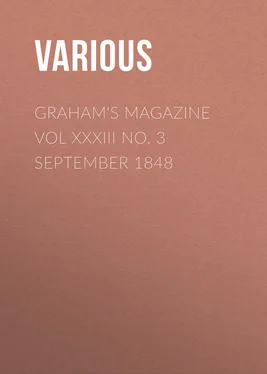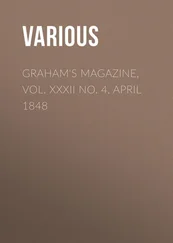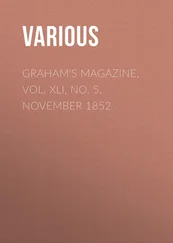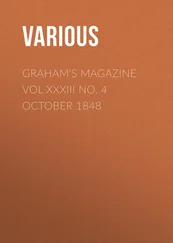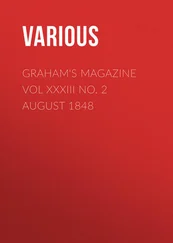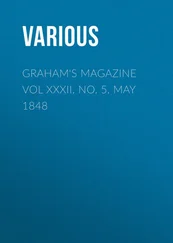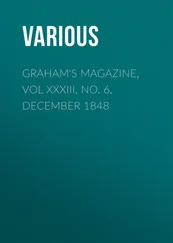Various - Graham's Magazine Vol XXXIII No. 3 September 1848
Здесь есть возможность читать онлайн «Various - Graham's Magazine Vol XXXIII No. 3 September 1848» — ознакомительный отрывок электронной книги совершенно бесплатно, а после прочтения отрывка купить полную версию. В некоторых случаях можно слушать аудио, скачать через торрент в формате fb2 и присутствует краткое содержание. Издательство: Иностранный паблик, Жанр: periodic, literature_19, foreign_edu, на английском языке. Описание произведения, (предисловие) а так же отзывы посетителей доступны на портале библиотеки ЛибКат.
- Название:Graham's Magazine Vol XXXIII No. 3 September 1848
- Автор:
- Издательство:Иностранный паблик
- Жанр:
- Год:неизвестен
- ISBN:нет данных
- Рейтинг книги:3 / 5. Голосов: 1
-
Избранное:Добавить в избранное
- Отзывы:
-
Ваша оценка:
- 60
- 1
- 2
- 3
- 4
- 5
Graham's Magazine Vol XXXIII No. 3 September 1848: краткое содержание, описание и аннотация
Предлагаем к чтению аннотацию, описание, краткое содержание или предисловие (зависит от того, что написал сам автор книги «Graham's Magazine Vol XXXIII No. 3 September 1848»). Если вы не нашли необходимую информацию о книге — напишите в комментариях, мы постараемся отыскать её.
Graham's Magazine Vol XXXIII No. 3 September 1848 — читать онлайн ознакомительный отрывок
Ниже представлен текст книги, разбитый по страницам. Система сохранения места последней прочитанной страницы, позволяет с удобством читать онлайн бесплатно книгу «Graham's Magazine Vol XXXIII No. 3 September 1848», без необходимости каждый раз заново искать на чём Вы остановились. Поставьте закладку, и сможете в любой момент перейти на страницу, на которой закончили чтение.
Интервал:
Закладка:
Two more letters came from Augusta Lenox about this time, and remained unanswered. "Wait till I am engaged," Angila had unconsciously said to herself, and then blushed the deepest blush, as she caught the words that had risen to her lips.
She did not wait long, however. Bright, beaming, blushing and tearful, she soon announced the intelligence to her mother, asking her consent, and permission to refer Mr. Hazlewood to her father.
The Mervales were very well pleased with the match, which, in fact, was an excellent one, young Hazlewood being in every respect Angila's superior, except in appearance, where she, as is the woman's right, bore the palm of beauty. Not but that she was quick, intelligent, and well cultivated; but there are more such girls by hundreds in our community, than there are men of talent, reading, industry and worth to merit them; and Angila was amazingly happy to have been one of the fortunate few to whose lot such a man falls.
And now, indeed, she wrote a long, long letter to Augusta – so full of happiness, describing Hazlewood, as she thought, so distinctly, that Augusta must recognize him at once – so she concluded by saying,
"And now I need not name him, as you must know who I mean."
"I must know who she means!" said Augusta, much perplexed. "Why I am sure I cannot imagine who she means! Talented, agreeable, with cultivated tastes! Who can it be? 'Not handsome, but very gentlemanlike-looking.' Well, I have no idea who it is – I certainly cannot know the man. But as we sail next week, I shall be at home in time for the wedding. How odd that I should be really her bridemaid in May after all!"
Miss Lenox arrived about two months after Angila's engagement had been announced, and found her friend brilliant with happiness. After the first exclamations and greetings, Augusta said with impatient curiosity,
"But who is it, Angila – you never told me?"
"But surely you guessed at once," said Angila, incredulously.
"No, indeed," replied her friend, earnestly, "I have not the most distant idea."
"Why, Robert Hazlewood, to be sure!"
"Robert Hazlewood! Oh, Angila! You are jesting," exclaimed her friend, thrown quite off her guard by astonishment.
"Yes, indeed!" replied Angila, with eager delight, attributing Augusta's surprise and incredulous tones to quite another source. "You may well be surprised, Augusta. Is it not strange that such a man – one of his superior talents – should have fallen in love with such a mad-cap as me."
Augusta could hardly believe her ears. But the truth was, that Angila had so long since forgotten her prejudice, founded on nothing, against Hazlewood, that she was not conscious now that she had ever entertained any such feelings. She was not obliged, in common phrase, to "eat her own words," for she quite forgot that she had ever uttered them. And now, with the utmost enthusiasm, she entered into all her plans and prospects – told Augusta, with the greatest interest, as if she thought the theme must be equally delightful to her friend – all her mother's long story about the old Hazlewoods, and what a "charming nice family they were," ("those pattern people that she hated so," as Augusta remembered, but all of which was buried in the happiest oblivion with Angila,) and the dear little house that was being furnished like a bijou next to Mrs. Constant's, (next to Mrs. Constant's! – one of those small houses with low ceilings! Augusta gasped;) and how many servants she was going to keep; and what a nice young girl she had engaged already as waiter.
"You mean, then, to have a woman waiter?" Augusta could not help saying.
"Oh, to be sure!" said Angila. "What should I do with a man in such a pretty little establishment as I mean to have. And then you know we must be economical – Mr. Hazlewood is a young lawyer, and I don't mean to let him slave himself to make the two ends meet. You'll see what a nice economical little housekeeper I'll be."
And, in short, Augusta found that the same bright, warm imagination that had made Angila once dream of Ossian-heroes, now endowed Robert Hazlewood with every charm she wanted, and even threw a romantic glow over a small house, low ceilings, small economies, and all but turned the woman-servant into a man. Cinderella's godmother could hardly have done more. Such is the power of love!
"Well," said Augusta, in talking it all over with her brother, "I cannot comprehend it yet; Angila, who used to be so fastidious, so critical, who expected so much in the man she was to marry!"
"She is not the first young lady who has come down from her pedestal," replied her brother, laughing.
"No, but she has not," returned Augusta, "that's the oddest part of the whole – she has only contrived somehow to raise Hazlewood on a pedestal, too. You'd think they were the only couple in the world going to be married. She's actually in love with him, desperately in love with him; and it was only just before I went to New Orleans that she said – "
"My dear," interrupted her mother, "there's no subject on which women change their minds oftener than on this. Love works wonders – indeed, the only miracles left in the world are of his creation."
"But she used to wonder at Mary Morton's liking him, mamma."
"Ah, my dear," replied her mother, "that was when he was attentive to Mary Morton and not her. It makes a wonderful difference when the thing becomes personal. And if you really love Angila, my dear, you will forget, or at least not repeat, what she said six months before marriage."
A NEW ENGLAND LEGEND
"God's blessing on the bonny barque!" the gallant seamen cried,
As with her snowy sails outspread she cleft the yielding tide —
"God's blessing on the bonny barque!" cried the landsmen from the shore,
As with a swallow's rapid flight she skimmed the waters o'er.
Oh never from the good old Bay, a fairer ship did sail,
Or in more trim and brave array did court the favoring gale.
Cheerily sung the marinere as he climbed the high, high mast,
The mast that was made of the Norway pine, that scorned the mountain-blast.
But brave Mark Edward dashed a tear in secret from his eye,
As he saw green Trimount dimmer grow against the distant sky,
And fast before the gathering breeze his noble vessel fly.
Oh, youth will cherish many a hope, and many a fond desire,
And nurse in secret in the heart the hidden altar-fire!
And though young Mark Edward trode his deck with footstep light and free,
Yet a shadow was on his manly brow as his good ship swept the sea;
A shadow was on his manly brow as he marked the fading shore,
And the faint line of the far green hills where dwelt his loved Lenore.
Merrily sailed the bonny barque toward her destined port,
And the white waves curled around her prow as if in wanton sport.
Merrily sailed the bonny barque till seven days came and past,
When her snowy canvas shivered and rent before the northern blast,
And out of her course, and away, away, careered she wild and fast.
Black lowered the heavens, loud howled the winds, as the gallant barque drove on,
"God save her from the stormy seas," prayed the sailors every one,
But hither and thither the mad winds bore her, careening wildly on.
Oh, a fearful thing is the mighty wind as it raves the land along,
And the forests rock beneath the shock of the fierce blasts and the strong,
But when the wild and angry waves come rushing on their prey,
And to and fro the good ship reels with the wind's savage play,
Oh! then it is more fearful far in that frail barque to be,
At the mercy of the wind and wave, alone upon the sea.
Mark Edward's eye grew stern and calm as day by day went on,
And farther from the destined port the gallant barque was borne.
From her tall masts the sails were rent, yet fast and far she flew,
But whither she drove there knew not one among her gallant crew,
Nor the captain, nor the marineres, not one among them knew.
Now there had come and past away full many weary days,
And each looked in each other's face with sad and blank amaze,
For ghastly Famine's bony hand was stretched to clutch his prey,
And still the adverse winds blew on as they would blow alway.
And dark and fearful whispered words from man to man went past,
As of some dread and fatal deed which they must do at last.
And night and morn and noon they prayed, oh blessed voice of prayer!
That God would bring their trembling souls out of this great despair.
And every straining eye was bent out o'er the ocean-wave,
But they saw no sail, there came no ship the storm-tost barque to save.
The fatal die was cast at length; and tears filled every eye
As forth a gentle stripling slept and gave himself to die.
They looked upon his pure white brow, and his face so fair to see,
And all with one accord cried out, "Oh, God! this must not be!"
And brave Mark Edward calmly said, "Let the lot fall on me."
"Not so," the generous youth exclaimed, "of little worth am I,
But 'twould strike the life from out us all were it thy lot to die."
"Let us once more entreat the Lord; he yet our souls may spare,"
And kneeling down the gray-haired man sent up a fervent prayer.
Oh mighty is the voice of prayer! to him that asks is given,
And as to Israel of old was manna sent from heaven,
So now their prayer was answered, for, leaping from the sea,
A mighty fish fell in their midst, where they astonished be.
"Now glory to the Father be, and to the Son be praise!
Upon the deep He walketh, in the ocean are His ways,
'Tis meet that we should worship Him who doeth right always."
And then from all that noble crew a hymn of joy arose —
It flowed from grateful hearts as free as running water flows.
Интервал:
Закладка:
Похожие книги на «Graham's Magazine Vol XXXIII No. 3 September 1848»
Представляем Вашему вниманию похожие книги на «Graham's Magazine Vol XXXIII No. 3 September 1848» списком для выбора. Мы отобрали схожую по названию и смыслу литературу в надежде предоставить читателям больше вариантов отыскать новые, интересные, ещё непрочитанные произведения.
Обсуждение, отзывы о книге «Graham's Magazine Vol XXXIII No. 3 September 1848» и просто собственные мнения читателей. Оставьте ваши комментарии, напишите, что Вы думаете о произведении, его смысле или главных героях. Укажите что конкретно понравилось, а что нет, и почему Вы так считаете.
